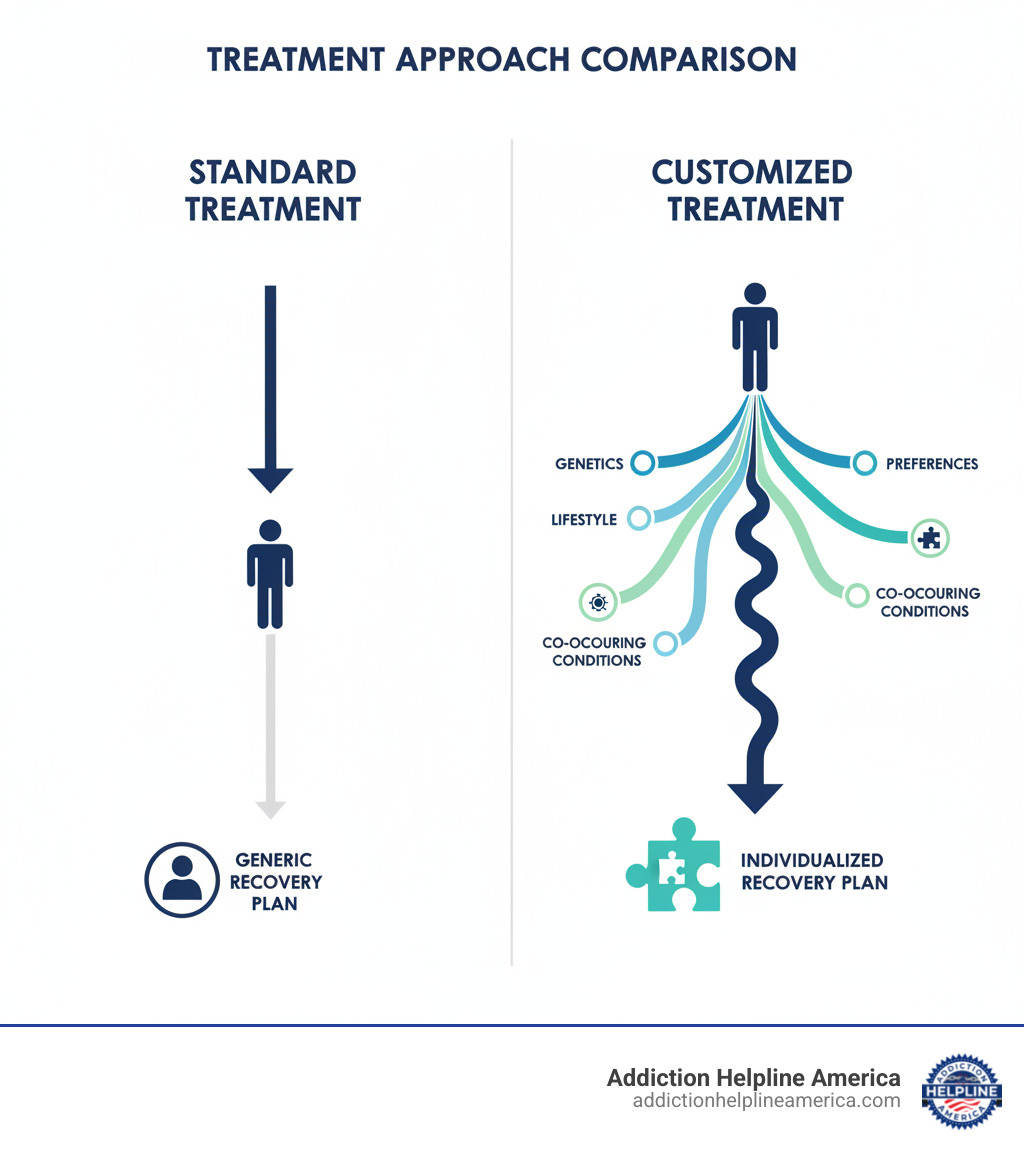
Moving Beyond One-Size-Fits-All Recovery
If you’re struggling with addiction, you deserve more than a generic approach. Healthcare is shifting away from treating every patient the same, recognizing that your recovery journey is as unique as you are. Customized treatment plans are personalized strategies for addiction and mental health recovery. They consider your unique genetic makeup, medical history, lifestyle, and personal preferences, rather than applying a standard protocol to everyone.
Traditional “one-size-fits-all” treatments often overlook what makes you different, leading to ineffective care, side effects, and a sense that recovery isn’t working. But it doesn’t have to be this way.
Key Differences:
- Standard Treatment: A rigid, one-size-fits-all approach that may overlook co-occurring disorders and lead to low engagement.
- Customized Treatment: A flexible plan custom to your genetics, lifestyle, and mental health, which adapts over time and boosts engagement because you help shape it.
Research consistently shows that customized treatment plans lead to better effectiveness, fewer side effects, and stronger long-term recovery. This is why the personalized medicine market is growing rapidly, reflecting a powerful truth: when treatment is custom to the individual, outcomes improve dramatically.
At Addiction Helpline America, we connect people with treatment programs that harness the power of personalization. We understand that there is no single “right” way to recover—only the way that works for you.
Customized treatment plans terms at a glance:
What is Personalized Healthcare and How Does It Differ?
Personalized healthcare, or precision medicine, represents a fundamental shift in treatment. Instead of applying the same protocol to everyone with a similar diagnosis, it asks: What makes you different?
A customized treatment plan considers your unique medical history, genetic makeup, lifestyle, environment, and personal goals. It recognizes that your body processes medications differently, and your triggers and support systems are unlike anyone else’s. This isn’t just a nice idea—it’s the new standard of care, with healthcare systems worldwide investing in this approach because the evidence is clear: when treatment is custom to the individual, people get better. For more on this shift, see this piece in NEJM Catalyst.
Here’s how traditional care stacks up against customized treatment plans:
| Feature | Traditional “One-Size-Fits-All” Care | Customized Treatment Plans |
|---|---|---|
| Approach | Standardized protocols applied to all patients with similar diagnoses. | Custom to individual patient characteristics, needs, and preferences. |
| Patient Data Considered | General medical history, common symptoms, broad diagnostic categories. | Comprehensive data: genetic makeup, medical history, lifestyle, environment, personal preferences, co-occurring conditions. |
| Treatment Selection | Based on population-level averages and typical responses. | Based on individual biology, predicted drug responses, and personal circumstances. |
| Effectiveness | May be ineffective for individuals whose biology or lifestyle deviates from the “average.” | Higher likelihood of effectiveness due to precise targeting of individual needs. |
| Side Effects | Higher risk of adverse reactions or suboptimal outcomes due to generic drug dosages/types. | Reduced risk of side effects by optimizing drug choices and dosages based on genetic profiles. |
| Patient Engagement | Often passive; patients follow instructions. | Active and participatory; patients collaborate in decision-making, increasing motivation and adherence. |
| Focus | Primarily reactive, treating existing disease. | Proactive, focusing on wellness, early intervention, and prevention. |
| Flexibility | Limited; changes are often reactive to treatment failure. | Dynamic and adaptable; plans evolve with the patient’s progress and changing needs. |
| Underlying Issues | May overlook unique triggers, traumas, or co-occurring mental health conditions. | Addresses the complete health picture, including emotional, social, and physical factors. |
The Problem with Standard Protocols
Traditional healthcare often relies on the “average patient fallacy”—the belief that what works for most will work for everyone. But there is no average patient. Your body metabolizes medications differently, your trauma is unique, and your life circumstances are central to your recovery.
When treatment centers use standard protocols, they risk ineffective treatment for those who don’t fit the mold. You might spend months on a medication that was never going to work for you, leading to unnecessary side effects and a lack of engagement. When a care plan doesn’t acknowledge your personal story, it’s hard to stay motivated. You need to feel seen, heard, and understood.
The Core Principles of a Personalized Approach
Customized treatment plans are built on a foundation that puts you at the center. Key principles include:
- Patient-centered care: You are an active partner in your recovery, not a passive recipient of instructions. Your voice, experiences, and goals shape the path forward.
- Collaborative decision-making: You and your care team establish shared goals together. Your preferences and values drive treatment choices, building trust and empowering you.
- Dynamic and adaptable plans: Recovery isn’t a straight line. Your plan must be flexible, evolving as you grow and adjusting when challenges arise through regular check-ins.
- Focus on the whole person: This holistic approach looks beyond the diagnosis to include your physical, psychological, social, and emotional wellbeing. Healing one part of you affects all the others.
- Integration of multiple data sources: A complete picture is formed by combining genetic profiles, medical history, lifestyle habits, and personal experiences to create a truly custom approach.
At Addiction Helpline America, we connect you with programs that accept these principles, because we’ve seen how personalized care transforms outcomes.
The Key Components of Your Customized Treatment Plan
A customized treatment plan is like a detailed map built from scratch just for you. It integrates multiple layers of information to create a complete picture of your health.
This includes your genetic information and biomarkers (indicators in blood or saliva) to understand your unique biology. But it also includes crucial lifestyle factors like diet, sleep, and exercise, as well as environmental influences such as your living situation and daily stressors. Most importantly, your personal preferences, cultural background, and values guide the entire process. If you have co-occurring disorders like depression or anxiety, the plan must address these interconnected challenges simultaneously.
The Role of Your Unique Biology and Genetics
Why do two people have different reactions to the same medication? The answer is often in their genes. The field of pharmacogenomics studies how your genetic makeup affects your response to drugs. By using genetic testing, clinicians can move beyond the old trial-and-error approach.
This allows them to predict drug response from the start, selecting medications and dosages that match your unique biology. This not only improves the chances of finding an effective treatment quickly but also helps in minimizing adverse reactions. In addiction treatment, this means tailoring medication choices for medication-assisted treatment (MAT) to what is most likely to work for you. Personalized psychiatry aims to administer the most effective drug with the fewest side effects by considering your genetic structure, turning medication management from a guess into a science.
Why Your Lifestyle and Preferences Matter
Recovery happens in your real life, so your treatment plan must fit into it. A truly effective plan incorporates the fabric of your everyday existence.
- Diet, Nutrition, and Exercise: What you eat and how you move affect your mood, energy, and mental health. A personalized plan includes guidance on nutrition and physical activity that fits your needs and interests.
- Social and Support Systems: Family, friends, and support groups are vital. Your plan may include family therapy or strategies to strengthen these connections, as research shows involving loved ones boosts recovery outcomes.
- Spiritual or Cultural Beliefs: A culturally sensitive plan respects and incorporates your beliefs, whether through faith-based groups or spiritual practices, fostering deeper engagement.
- Personal Goals and Values: What kind of life do you want to build? Aligning your treatment with your personal aspirations—like repairing relationships or returning to work—provides a powerful sense of purpose.
By incorporating your preferences, the plan becomes something you can stick with. This collaborative approach ensures you are an active participant in building your new life, which makes all the difference in achieving lasting change.
The Proven Benefits of a Custom Recovery Journey
Choosing a customized treatment plan can fundamentally change your recovery experience and outcomes. When treatment is designed for you, everything improves. You’ll find treatment is more effective because it targets your specific biology, and you’ll experience fewer side effects because medications are chosen based on your body’s ability to process them.
Because you help create the plan, you’ll be more engaged in the process, which builds a stronger relationship with your care providers. This collaborative foundation leads to better long-term outcomes and is especially critical for addressing complex situations like a dual diagnosis, where addiction and mental health conditions occur together.
How Personalization Boosts Treatment Effectiveness
The power of customized treatment plans lies in precision. Instead of a trial-and-error approach, your care team can identify what’s most likely to work from the start.
Targeted therapies prevent the frustration of using approaches that don’t fit your needs. When a plan reflects your preferences and fits your life, increased adherence follows naturally. It’s not about willpower; it’s about relevance. Research on personalized mental health interventions consistently shows that individualized approaches lead to significantly better outcomes and higher success rates in addiction recovery. The most effective care combines scientific evidence, clinical expertise, and your personal values, creating a treatment you can actively accept.
Enhancing Patient Engagement and Trust
Customized treatment transforms the dynamic between you and your care team. You become a valued partner in your own healing.
Shared decision-making puts you in the driver’s seat, building a sense of agency. When your care team understands your unique story—your life circumstances, traumas, and strengths—you feel genuinely heard, which builds deep trust and motivation. The plan isn’t something imposed on you; it’s yours. This ownership over your recovery journey is perhaps the most valuable benefit.
This process builds a strong therapeutic alliance: a trusting relationship characterized by mutual respect and open communication. This ensures your plan can evolve with you, adapting as your needs change. At Addiction Helpline America, we’ve seen how this personalized approach transforms lives, helping people reclaim their futures.
How Technology is Shaping the Future of Personalized Treatment
Technology is revolutionizing how we create customized treatment plans. Artificial intelligence, big data analytics, wearable devices, and telehealth are making it possible to tailor recovery with unprecedented precision.
These tools can analyze your genetic data, medical history, and lifestyle to find patterns no human could spot. Wearable devices provide real-time feedback on sleep and stress levels, while telehealth brings specialized care directly to you. These advancements are fundamentally changing what’s possible in recovery.
The Power of AI and Data in Creating customized treatment plans
AI and data analytics are making customized treatment plans more effective than ever. Predictive modeling uses AI to forecast how you’ll respond to different treatments, avoiding a lengthy trial-and-error process. The technology can also identify who is at higher risk for relapse, allowing care teams to intervene proactively.
Perhaps most powerfully, AI allows for optimizing your treatment in real-time. For example, if a wearable device detects worsening sleep patterns (an early warning sign of stress), it can alert your therapist to provide immediate support. As noted in a scientific review of AI in personalized medicine, this ability to analyze massive datasets is generating more accurate and successful personalized treatment strategies.
Challenges and Ethical Considerations
While promising, these technologies raise important questions. Data privacy and security are paramount, as this information is incredibly sensitive. Strict regulations like HIPAA and GINA exist to protect you, but these safeguards must evolve with technology.
Furthermore, the cost and accessibility of these tools could create a two-tier system, and algorithmic bias could perpetuate healthcare disparities if not carefully managed. Ensuring equitable access for all, regardless of income, location, or background, is crucial. The future of personalized treatment is bright, but only if we use these tools to improve the human connection at the heart of recovery, not replace it.
How to Develop and Start Your Personalized Health Plan
Starting your recovery with a customized treatment plan is a collaborative process. At Addiction Helpline America, we guide people through these steps to find a program that offers truly personalized care. The journey is a partnership between you and your clinical team.
A Collaborative Process: Your Role and the Clinician’s Role
Developing your plan involves several key stages where your input and the clinician’s expertise come together:
-
Initial Assessment and Evaluation: The process begins with a conversation. You’ll discuss your substance use history, mental health concerns, and recovery goals. This is your opportunity for honest self-reporting, which is the foundation of an effective plan. The clinical team will then conduct a comprehensive evaluation, which may include reviewing your medical history, using diagnostic tools, and possibly genetic testing to gather and analyze data.
-
Co-Creating the Plan: This is where the partnership truly shines. The clinical team will explain treatment options and recommendations based on all the gathered information. Your role is to communicate your preferences and goals. Do you prefer group or individual therapy? Are there cultural or spiritual practices important to you? By asking questions and sharing your perspective, you help co-create a plan you can stick with.
-
Setting Goals Together: You and your team will establish clear, achievable goals. These might be short-term targets, like completing detox safely, or long-term aspirations, like repairing relationships. The key is that these goals reflect your priorities.
-
Continuous Monitoring and Adjustment: Recovery is dynamic, and your plan should be too. Your role is to provide ongoing feedback about what’s working and what isn’t. The clinical team provides ongoing support and modification, using regular check-ins to adjust the plan as your needs evolve. This flexibility is what makes personalized care so effective in the long run.
Your active participation is essential. You are the expert on your own life, and that expertise is invaluable in creating a customized treatment plan that leads to lasting success. At Addiction Helpline America, we connect you with programs that value this collaborative approach, ensuring you are a partner in your recovery from day one.
Conclusion: Take the First Step Toward a Plan Built for You
Your recovery journey doesn’t have to follow a generic script. As we’ve seen, customized treatment plans are revolutionizing addiction and mental health recovery by moving away from outdated, one-size-fits-all approaches.
When treatment is designed for your unique biology, lifestyle, and personal goals, the results are clear: more effective therapy, fewer side effects, and a stronger investment in your own success. You build a genuine partnership with your care team, creating a path to recovery that actually fits your life.
You deserve more than a generic approach.
Your story is unique, and your path forward should be just as individual. At Addiction Helpline America, we’ve helped thousands find treatment programs that accept this truth. Our team provides free, confidential guidance, connecting you with centers from our nationwide network that specialize in creating truly personalized plans.
Recovery is possible. It starts with a conversation. You don’t have to figure this out alone or settle for a solution not designed for you.
Take that first step today. Find a personalized treatment program near you and find what recovery looks like when the plan is built for you.
Our helpline is 100%
free & confidential
If you or someone you care about is struggling with drug or alcohol addiction, we can help you explore your recovery options. Don’t face this challenge alone—seek support from us.
Programs
Resources
Will my insurance
cover addiction
treatment?
We're ready to help
Find the best
drug or alcohol treatment
center
Are you or a loved one struggling with addiction? Call today to speak to a treatment expert.
















